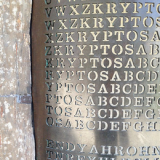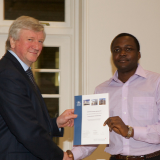Can’t Hurt Me (2018) Book Summary & Insights
Book Title: Can’t Hurt Me
Subtitle: Master Your Mind and Defy the Odds
Publication Date: 2018
Author Name: David Goggins
About The Author
David Goggins is an American long distance cyclist, triathlete, author, ultra-marathon runner and motivational speaker. He is famous for his inspirational story which he shares in his self-help memoir titled Can’t hurt me and for holding a world record in 2014 for most push-ups done in 24 hours. Goggins is a former United States Air Force member and retired as a United States Navy SEAL. David is the only member of the US Armed Forces to have completed the Air Force Tactical Air Controller training, SEAL Training, and the US Army Ranger School; impressive feats which he achieved after battling with his weight problems, asthma and sickle cell. He has also received accolades for raising over $2 million for charity and more.
Book Summary
Although we are all aware of the importance of maintaining a strict fitness plan and exercising, so many of us struggle with putting our knowledge to work. Goggins writes this book as a call to action to all of us who undermine our health because of a lack of exercise regimens. He highlights his own experiences from his abusive childhood to his harsh youth and overweight adulthood. The moral the book strives to teach us is that if the author can overcome a traumatic childhood, overweight problems to join the NAVY Seal, run a gruelling marathon race and, keep up with a strict fitness regimen while still working a 9-5 job, we can do it too.
Who Is This Book For?
This book is for fitness enthusiasts and people looking for motivation to face various struggles in life.
Buy Book: Support The Book Author(s) And Our Work
Great books should be read, studied, and reviewed frequently, so reading the actual book may provide more value to you than the book insights on this page. Besides, this would support the work of the book author and what we do on LarnEdu. What could be better?
Important Notes
We get a small compensation from Amazon when you visit your nearest/local Amazon site via our affiliate link to purchase an item within 24 hours or if you add it to your cart and checkout within 90 days. This is no additional cost to you and supports our work.
The information on this page is meant to supplement the actual book(it is not a book review but distils the key insights or ideas from the book in under 5000 words). The content creator or LarnEdu does not necessarily support the views, thoughts, and opinions expressed in the text/book. Reasonable skepticism should be applied with any views, thoughts or opinions expressed/shared by the book author or content creator.
Reading the contents of this page does not guarantee specific results. The best lessons are achieved from taking consistent action in the real world rather than being addicted to the illusion of progress by getting stuck on reading an infinite amount of books or book summaries and insights. LarnEdu and the content creator accepts no responsibility or liability for the accuracy of the information on this page or how it is used.
Book Insights

The Early Childhood
We should fondly remember our childhood as a carefree time, filled with happy memories of play and fun. The author had a different experience during his own childhood; mostly because of an abusive father and hostile family environment.
Goggins was born in New York City in the year 1975 to a father who terrorised him and his mother. As early as age 6, Goggins and his older brother and mother, suffered hard labour at the hands of their father, Trunnis. Trunnis saw it fit to turn his young family into his personal labourers, using them to run his roller-disco rink.
Trunnis made Goggins, along with his mother and brother, to work almost nightly at the rink; most times staying till midnight. Their late hours often caused Goggins’ mother to cook her sons’ dinner and put them to bed at the rink. The roller-disco rink was no suitable place for children to sleep, and Goggins often found himself tired out from the late nights when faced with schoolwork in the morning.
Not just his schoolwork suffered during his hard childhood. He had to put up with watching his father beat his mother as a punishment for her misdeeds. Never able to do anything about it, Goggins had to do his best to hide his own bruising. Trunnis’ cruelty reached its peak when he punished Goggins’ mom for taking him to a hospital for an ear infection.
David’s luck finally gave in when his mother escaped her husband’s brutality when he was eight years old. With the help of a sympathetic neighbour and some smart thinking, she gathered enough to pack up her son and move to Brazil, Indiana. David’s older brother; however, refused to leave with them and stayed on with their father.
Teenage Years
The author escaped his father’s brutality but, that was not the end of hardships for him. Faced with their newfound freedom, he and his mother lived with poverty, and little means to support themselves.
Combined with dealing with their sudden poverty, Goggins experienced the side effects of his harsh childhood. His hair fell out, and he developed a stutter because of toxic stress. David had suffered so much his body and mind had developed a permanent danger alert mode.
The side effects did not end with those symptoms. David also had to deal with limited memories which severely affected his school work. Now, besides being a coloured child at his school, he faced ridicule from his peers and teachers for being stupid. David has gone on to say in interviews that he was called a nigger many times of his life growing up. His tormentors went as far as spray painting “nigger, we are going to kill you” on his first car.
To avoid being classified a “special need” child, David cheated to pass his tests and exams. Even though he escaped the special needs facility, Goggins suffered from this because it meant that although he moved up in class, he could barely read.
During his late teens, David still struggled with his literacy problems, until the United States Air Force caught his attention. He cleaned up his act and learned to read to get accepted into the Air Force training. This was; however, not the end of his trials.
David had a deep fear of swimming which he had yet to face. Unfortunately, becoming an Air Force para-rescue meant that he needed to complete swimming tests. Unable and unwilling to overcome his fear, David quit his dreams. His desire to join the Air Force was strong, but he allowed his fear get the better of him.
By the time he was 24 years old; David had abandoned all hopes of joining the military and had accepted a job as a part-time pest exterminator. Disappointed with the path his life was on; he turned to food to make up for his depression. During this time, he gained an alarming 40 pounds thanks to his unhealthy eating habits.
Turning Point
Luckily for Goggins, this depressive lifestyle was about to end as he soon found a motivation to clean up his act. While going through his usual massive breakfast one morning, he saw a TV documentary about the trainings Navy Seals go through and how dedicated they were to physical fitness.
Their disciplined life was a stark contrast to Goggins’ and he suddenly had the strongest urge to enlist himself in their training. After many calls and research, he discovered that there was an opening for new recruitments coming up soon.
This was good luck for Goggins, but it also posed a serious problem for him. First, his weight gain meant that he was above the stipulated weight for recruits, and second, the organisers scheduled the program to close in three months; giving Goggins approximately three months to lose over 100 pounds. Undeterred, David set up a rigorous exercise plan that involved a 4:30am rising time, two hours on an exercise bike, and a two-hour swim session daily. He did not stop there. He followed this by gruelling hours in the gym to work on individual muscles and, after dinner, back to the gym he went.
His impressive training plan meant that within two weeks, Goggins had lost 25 pounds. When the three months ended, he was in top physical shape and joined the Navy Seals program. His exposure to gruelling trainings meant he could tough out the rigorous Navy Seals exercise drills and finally achieve his dreams.
Ultra Running
Goggins made it through the rigorous Navy Seals training but, his thirst for more challenges was stronger than ever. In 2005, he found just the thing to feed his hunger for new challenges in ultra running.
The first ultra race he ran was for a charitable cause. They organised the Badwater 135 in honour of fallen military men, to raise funds for their families. The Badwater 135 is a 135-mile race in the harshest conditions, including elevated heights and through blistering heat. They schedule the race in July, to put the contestants through the gruelling heat of Death Valley.
Goggins, set to compete in the ultra marathon, needed to compete in a 100-mile race first; which he successfully did with zero special training. His triumph meant that he was now qualified to run the 2006 Badwater 135, and he went into full preparation mode. Carefully, he noted the trails and terrains surrounding the race, while also training in hot conditions similar to the race’s climate.
His trainings eventually paid off, with Goggins finishing the race at 5th place.
Goggins’ Success Story
Goggins has made a name for himself — not just for being one of the few African American SEALS in the US, but also for being a skilled ultra runner. His secret to achieving all he has: work ethic.
We might go down in history as the laziest generation, mostly owing to the dawn of technology and the quick fixes now available to us. Goggins belief is that hard work is the only true way to get to your true potential. No quick fixes for that. No matter how much talent you have; without the proper work ethic, you would never reach your true potential.
Goggins does not accept the everyday excuse we give about not having the time to balance our work with family matters and an exercise routine. He says the secret is in making the best of our mornings. He starts his typical days at 4 am and goes for at least a 6 mile run. This leaves him enough time to get back home and get ready for work. He squeezes in more exercising with his 25 mile bike ride to work, and a 6 mile run during his lunch break. At closing time, he has kept to his strict regimen, while still maintaining his desk job.
Emulating Goggins success is easy enough. All you really need is enough determination and hard work to reach your goals. If David Goggins can do it, so can you.
Key Quotes
“Our culture has become hooked on the quick-fix, the life hack, efficiency. Everyone is on the hunt for that simple action algorithm that nets maximum profit with the least amount of effort. There’s no denying this attitude may get you some of the trappings of success, if you’re lucky, but it will not lead to a calloused mind or self-mastery. If you want to master the mind and remove your governor, you’ll have to become addicted to hard work. Because passion and obsession, even talent, are only useful tools if you have the work ethic to back them up.”
“In the military we always say we don’t rise to the level of our expectations, we fall to the level of our training,”
“You are in danger of living a life so comfortable and soft, that you will die without ever realising your true potential.”
Conclusion
David Goggins came from one of the worst childhood conditions and still saw through his military dreams. He let nothing come between him and his dreams; not his traumatic childhood, poverty, or learning difficulties. And even when he hit setbacks because of his weight, he still came out on top.
How does David Goggins tell us we can begin our new, disciplined lives? By getting up early in the morning and pushing ourselves past our perceived limits.
To master our own true capabilities, we must push ourselves mentally, physically and emotionally. Go beyond what your brain tells you is your limit and you would be amazed by how much more you actually can achieve.
Since You’re Here…
Great books should be read, studied, and reviewed frequently, so reading the actual book may provide more value to you than the book insights on this page. Besides, this would support the work of the book author and what we do on LarnEdu. What could be better?
You can also support the work we do at LarnEdu work by making a one/off or monthly donation(via PayPal) for as little as £0.99 or sharing this content.
Do you have any feedback or suggestions? Use the comment section below or send us a message.















